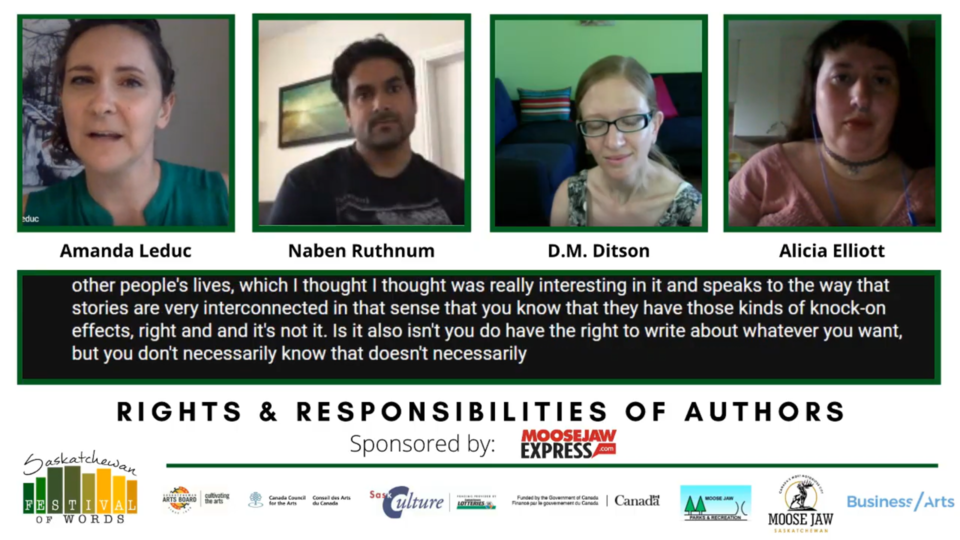The final day of the Saskatchewan Festival of Words began with a panel discussion on the contrast between the rights of a writer to write what they choose and the responsibilities of writers to their subject matter and represented narratives.
Author Amanda Leduc moderated the panel, titled “Rights Vs. Responsibilities As Writers,” which included fellow authors Naben Ruthnum, D.M. Ditson and Alicia Elliott.
All of the authors involved in the panel shared a short reading of their work, to preface the conversation that would follow.
Ruthnum shared an excerpt from his first novel Curry: Eating, Reading, and Race, while D.M. Ditson shared part of a journalistic piece she wrote about attending a doctor’s appointment with a source regarding medically assisted suicide. Elliott shared a section of the essay “On Seeing and Being Seen,” included in her book A Mind Spread Out on the Ground, regarding cultural misrepresentation.
All three authors agreed that there is a responsibility for writers to approach their subject with the appropriate considerations and to think about the effect certain elements might have on the audience when writing a particular story and narrative — including how that portrayal might be the first time a reader encounters that topic, culture, or perspective.
“As a writer, your words carry weight, or presumably they carry weight, so why would you put out work that might potentially damage the very communities you’re purporting to write about?” said Elliott.
The conversation about responsibility continued, addressing topics like the responsibility to the truth when writing from real events and the responsibility to respect voices or cultures included and represent them in an accurate way.
In terms of the rights of writers, the group agreed that it's difficult to consider an author’s right to write on any subject of their choosing without simultaneously considering the writer’s responsibility of approaching that subject in the correct way.
“Those concepts are really interrelated and in general I think that a writer has the right to approach any subject but then it's a matter of whether they can possibly do a good job of it,” said Ruthnum. “There's so many different things that outweigh your right to write a tory, [like] in the case of a journalistic experience.”
“I think there's something that happens where people conflate the right to write with the right to be published, [especially] on a large platform,” added Leduc. “And you can write whatever you want and with the Internet, put it out into the world but you’re not necessarily guaranteed an audience, particularly if you don’t put the care into shepherding your story and the people who are a part of that story.”
All four authors also agreed that the consideration of responsibility is universally important across all genres, from journalism to nonfiction and fiction writing, but sometimes the inner conversation occurs differently depending on the genre.
The panelists also spoke on the responsibility of publishers to consider the implications of marginalized perspectives and how they are represented in writing.
The panel concluded with several thought-provoking questions from the audience through the live chat feature.
The Festival of Words continues until the end of today, with a full schedule of events available here.
Stay tuned for coverage of the festival as it progresses through the week.




